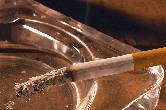
MONDAY, Jan. 10 (HealthDay News) — Young kids who live with a parent who smokes face an increased risk for developing high blood pressure while still children, a new study has found.
Warning that children with high blood pressure often become adults with the same problem, the researchers suggested that secondhand smoke poses a substantial and long-term risk to the cardiovascular welfare of young children.
“The prevention of adult diseases like stroke or heart attack begins during childhood,” said the study’s lead author, Dr. Giacomo D. Simonetti, an assistant professor of pediatrics at the Children’s Hospital at the University of Bern, in Switzerland. “Removing any avoidable risk factors as soon as possible will help reduce the risk for heart disease later on and improve the long-term health of children.”
And, he added, “Passive smoking is a risk factor. And an avoidable risk factor. So do not smoke because it is not healthy for you and for your children. Smoking increases your — and your children’s — blood pressure.”
Simonetti, who worked on the study while at the University of Heidelberg in Germany, and his colleagues report their findings in the Jan. 10 online edition of Circulation.
The researchers noted that high blood pressure is the prime risk factor for heart disease. And according to the American Cancer Society, about 46,000 non-smoking Americans die from heart disease each year as a result of living with smokers and the secondhand smoke they produce.
To gauge the impact of secondhand smoke on young children, the research team examined data on 4,236 healthy boys and girls, 5 to 6 years old, who lived in southwestern Germany. Nearly 29 percent of the children’s fathers and almost 21 percent of their mothers were smokers. For about 12 percent of the children, both parents smoked.
Even after accounting for other heart disease risk factors — such as low weight at birth, premature birth, high body mass index and parents with high blood pressure — parental smoking appeared to be an independent risk factor for high blood pressure among the children, the study found.
In fact, children exposed to parental secondhand smoke were 21 percent more likely to have the upper number of their blood pressure reading (the systolic figure, which corresponds to heart contractions) register at levels among the highest 15 percent of the population.
Mothers who smoked appeared to confer a worse impact on their child’s blood pressure levels than smoking fathers, although the researchers said that likely reflected maternal lifestyle and the generally greater amount of time the mothers spent in the home.
Dr. Gregg C. Fonarow, a cardiology professor at the University of California, Los Angeles, expressed little surprise at the findings.
“We certainly know that secondhand smoke is dangerous and associated with adverse consequences,” he noted. “In adults, there’s certainly higher heart attack and stroke risk, as well as lung disease. And it’s previously been known that secondhand smoke can be dangerous to children’s lungs,” he added.
“This look at its impact on blood pressure just reinforces the notion that there’s no acceptable exposure to secondhand smoke when it comes to infants and young children,” Fonarow said. “And it’s yet another reason why we need to protect them from exposure because it damages their lungs and blood vessels and can already manifest in harm to their blood pressure.”
More information
The American Cancer Society has more on secondhand smoke.

